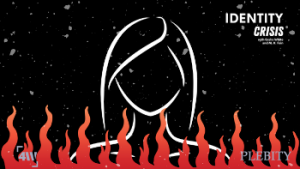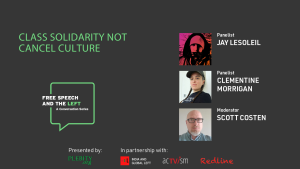We survived cancellation. You can, too.
“Identity Crisis” is a new weekly column and podcast for young people struggling with the modern orthodoxy of gender identity ideology—developed in collaboration between Plebity and 4W by M. K. Fain and Sasha White. Each week, we will answer one or two of your questions, both as a running column here on 4W, and in the form of a video on YouTube.
 In 2015, I lost my mother to suicide only a few weeks after being fired from what I believed was my dream job. At a time when I already lacked stability, I suddenly had to step up and help provide for my family.
In 2015, I lost my mother to suicide only a few weeks after being fired from what I believed was my dream job. At a time when I already lacked stability, I suddenly had to step up and help provide for my family.
A few years before that, I had to find a way to escape an abusive ex boyfriend with no money and nowhere to go.
Bouncing back from the brink of disaster has become like muscle memory to me.
Now, as women around the world face “cancellation” for daring to speak truths such as “men can’t become women” and “lesbians don’t have penises,” the fear of losing it all hangs heavy over the heads of heterodox feminists.
While everyone’s situation is unique, and I’ve certainly enjoyed some privileges that have aided my ability to bounce back each time, these are the skills that have helped me survive the immediate aftermath of being cancelled.
1. Prepare
If you’ve already been cancelled and are looking for advice on how to survive right now, it may be a little too late for you to do this one. But for everyone else, preparation is the single most powerful thing you can do to survive being cancelled. Consider cancellation like a natural disaster — it has the same ability to wreck your finances, your home, and even your physical safety. If you have the means to set money aside and build up savings, this should be an absolute priority. Not only will having savings help you in the case of cancellation, but in case of any financial disaster such as job loss, a medical emergency, or other crisis.
Another good way to prepare financially, even if you are not able to aggressively save money, is to prevent all your financial eggs from being in one basket. For example, consider having a couple different part-time jobs rather than one full-time job so that if you are fired from one, you still have some income. If you’re not ready to leave a full-time job with benefits, consider starting a side hustle or providing freelance services so that in the case of sudden job loss you still have paying work you can turn to.
If your current situation precludes you from preparing financially, there are still ways that you can prepare for cancellation in advance. The social impact of cancellation is often one of the most devastating. Prepare yourself socially by seeking out friendships with people who not just share your values, but who are open to different opinions and willing to be friends with people they disagree with. You can also begin to prepare your current friends by starting to have hard conversations about things you fear they may “cancel” you for in advance, so that the whole wave of cancellation doesn’t come at once.
Lastly, prepare yourself from some of the most nasty impacts of cancellation such as doxxing or hacking by cleaning up your online footprint. Google yourself, and see how much you can find. Is your address online? Phone number? Other private information you wouldn’t want out there? Put your social media on private, request to have your private information removed from people search sites (this is a helpful guide), and delete everything that could provide your private details to a malicious troll on the web. Be sure to also follow basic web safety recommendations, such as using a password manager and setting up multi-factor authentication on your accounts.
Following all of these steps in advance won’t prevent you from being cancelled, but it will help lessen the impact of the immediate crisis by ensuring you have your own situation under control.
2. Address your material needs first
When you are cancelled, and assuming you’re not prepared financially, the first thing you have to do is address your physical needs: food, water, shelter, and health/safety. Depending on your life situation at your moment of cancellation, this may be easier or harder for you. I can’t tell you exactly what to do in every unique situation, but these are some ways I have gotten through moments of immediate crisis to keep a roof over my head and my cat fed.
Bring your costs down as low as possible. Consider moving in with family or friends in the short term to give you time to rebuild financially. Alternatively, consider taking in a new roommate to help you with rent. Ditch any unnecessary expenses you may have.
Take any job you can get. I have worked many jobs that some may consider “beneath them” to make ends meet during tough times. After cancellation it may be hard to get a job in your professional industry, but you could probably get a job as a nanny, housekeeper, receptionist, mall kiosk cashier, or waitress — all jobs I have worked to get through periods of financial strife. At times, I have taken these jobs for only one month before quitting after something better came along, but having those gigs helped me get through and live another day.
If you have lost your health insurance and have immediate medical needs that must be addressed, after a job loss you would likely qualify for COBRA, a government health insurance scheme to provide continued access to your employee health insurance benefits after job loss. Otherwise, you may qualify for Medicaid and children may qualify for CHIP.
Depending on your state and circumstances, you could also qualify for other government benefits such as unemployment benefits, food stamps, or other assistance. Begin applying for these benefits immediately after being fired as sometimes the process can be lengthy. Do not be too proud to apply for benefits, or let the application process intimidate you. If you have paid taxes, you are entitled to your benefits. If you struggle with the application process, find an organized and savvy person in your life to sit down and do it with you.
Finally, don’t forget that the Plebity Free Speech Fund can help you meet your immediate needs in you face material consequences for your free speech. Apply to the Free Speech Fund here: plebity.org/free-speech-fund-application.
3. Lean on your support system
Speaking of the people in your life, be sure to lean on those left behind after cancellation (or, really, any disaster that uproots your life). While it may feel like you’ve lost everyone after being cancelled, likely there are still family members, friends, or loved ones who support you and would be happy to help in your time of need. Don’t be afraid to ask for the help you need, whether that is emotional or material.
Cancellation can often come with a huge side of betrayal of trust. People who you believed to be true friends may throw you under the bus or ghost on you. Many women I’ve spoken to who have been cancelled have a hard time trusting people after experiencing the social fall out (fallout) of cancellation. However, it is important not to isolate yourself because of this. Don’t fall into the trap of assuming everyone hates you, no one wants to help you, and you can’t trust anyone any more. Mostly likely, there are still people in your life who will stand by you. Sometimes, you might even be surprised who they are. Continue giving people a chance, even when it’s hard.
It’s common to experience depression, anxiety, or even PTSD-like symptoms after cancellation. If you’ve struggled with negative coping mechanisms in the past such as addiction, self harm, or risky behavior, you may find yourself returning to these familiar habits. Be honest with your support system about what you’re experiencing mentally and emotionally, and try to communicate as clearly as you can what they can do to support you. If you need professional help to navigate this crisis emotionally, ask for it.
4. Throw yourself into a project
Finally, once you have all your immediate physical and emotional needs met, it’s time to start figuring out what’s next. While you may not be ready to formulate a long-term game plan, consider throwing yourself into a project to distract your mind and help you return to a sense of purpose. For me, creating Spinster was that project. For you, it could be writing, DIY projects around the house, art, or maybe even starting your own business to build up long-term financial independence.
Once you’ve survived the immediate crisis of being cancelled, fired, or facing another social/natural/financial disaster that forces you to start from scratch, you’re ready to build back up again. For many, these moments become the catalyst for creating something great, or ushering in the next, better, phase of your life. Next week on Identity Crisis, we’ll talk about long-term strategies to make a grand comeback after being cancelled.
If You Know Someone in Crisis
Call the National Suicide Prevention Lifeline at 1-800-273-TALK (8255), or text the Crisis Text Line (text HELLO to 741741). Both services are free and available 24 hours a day, seven days a week. The deaf and hard of hearing can contact the Lifeline via TTY at 1-800-799-4889. All calls are confidential.
You can listen to “Identity Crisis” on Spotify, Google Podcasts, or wherever you get your podcasts. Subscribe to updates on Identity Crisis here: identitycrisis.xyz/get-updates




